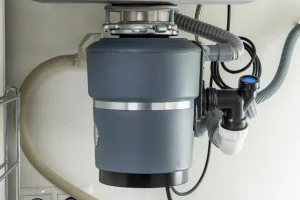
December 4, 2023
Most homeowners take their garbage disposal for granted. But the actual capability of these units and what most homeowners ask of them can be two very different things. So it is essential that you understand a few of the basics to avoid costly clogs and even the destruction of this hardworking appliance.
The Real Purpose Of A Disposal
The purpose of equipment is to grind up tiny bits of food rinsed from dishes and cookware. It was never designed to dispose of large chunks of wasted food, grease, oil, and fat. And when you stuff that unwanted food and trash down into the disposal, you are severely shortening its life expectancy. Ideally, place a mesh screen over the drain when rinsing dishes to catch all the food particles that could clog or damage the disposal. And cooking oil, grease, and fat should be placed in the garbage and not down the drain.
The Hazards Of Oil And Grease
As you know, grease or oil and water do not mix. And when you rinse grease and oil down the disposal, it is not likely to make it to the city sewer. Instead, the grease coats the inside of the disposal and the drain pipes. As it dries, the coating becomes a sticky and stinky residue. Not only does it create that sour or foul odor near your kitchen sink drain, but it also traps food particles and begins to create clogs. Put all grease and oil in a container and place it in the garbage can to avoid nasty clogs in your drain and disposal.
Killer Foods
In this case, killer foods are the ones that should never find their way to your disposal. They are the items that are sure to clog, damage, or destroy your disposal. The list includes:
Eggshells
Coffee Grounds
Meat Bones
Fat
Paper Or Plastic
Fibrous Foods Like Celery Or Other Veggies
These items will either damage the grinding blades of the disposal, pack around the grinder, cause it to jam, or cause other things to get clogged in the blades or drain. Place these items in the trashcan to avoid clogs or the cost of a replacement garbage disposal.
Does Your Disposal Have Bad Breath?
Even when you are careful about what makes its way into your disposal, it can develop a less than pleasant odor. The smell is due to tiny bits of food waste, grease, and oil. When you waft that sour smell, your disposal is requesting some attention. And there are several safe and effective ways for you to clean the disposal and remove those unpleasant odors.
Baking soda and vinegar are ideal for scrubbing away sticky, smelly residue lingering in your garbage disposal. Pour half a cup of baking soda down the drain, followed by an equal amount of vinegar. Let the bubbles do their job removing the gunk and killing odor-causing bacteria. After 10 minutes, rinse with hot water for a few minutes with the disposal running.
Citrus is a great way to do a light cleaning and remove harsh odors between baking soda cleanings. Put a few pieces of citrus peel into the disposal and run the unit with hot water for a minute or two to create a wonderful fruity aroma.
A handful of ice cubes and a cup of rock salt will clean away debris and eliminate odors. Let the disposal run for a few minutes with the cold water running.
For help with a tough garbage disposal issue, call (570) 483-9194 to schedule a visit from the pros at Freedom Flow Plumbing.